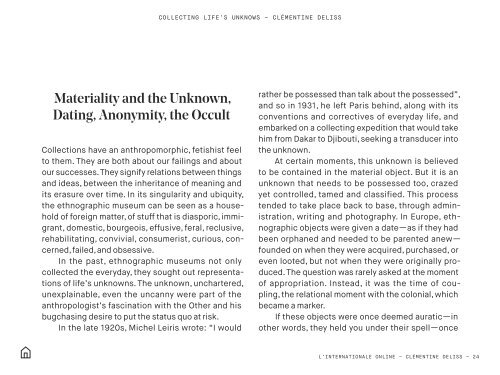DECOLONISING MUSEUMS
decolonisingmuseums-4
decolonisingmuseums-4
You also want an ePaper? Increase the reach of your titles
YUMPU automatically turns print PDFs into web optimized ePapers that Google loves.
COLLECTING LIFE’S UNKNOWS – CLÉMENTINE DELISS<br />
Materiality and the Unknown,<br />
Dating, Anonymity, the Occult<br />
Collections have an anthropomorphic, fetishist feel<br />
to them. They are both about our failings and about<br />
our successes. They signify relations between things<br />
and ideas, between the inheritance of meaning and<br />
its erasure over time. In its singularity and ubiquity,<br />
the ethnographic museum can be seen as a household<br />
of foreign matter, of stuff that is diasporic, immigrant,<br />
domestic, bourgeois, effusive, feral, reclusive,<br />
rehabilitating, convivial, consumerist, curious, concerned,<br />
failed, and obsessive.<br />
In the past, ethnographic museums not only<br />
collected the everyday, they sought out representations<br />
of life’s unknowns. The unknown, unchartered,<br />
unexplainable, even the uncanny were part of the<br />
anthropologist’s fascination with the Other and his<br />
bugchasing desire to put the status quo at risk.<br />
In the late 1920s, Michel Leiris wrote: “I would<br />
rather be possessed than talk about the possessed”,<br />
and so in 1931, he left Paris behind, along with its<br />
conventions and correctives of everyday life, and<br />
embarked on a collecting expedition that would take<br />
him from Dakar to Djibouti, seeking a transducer into<br />
the unknown.<br />
At certain moments, this unknown is believed<br />
to be contained in the material object. But it is an<br />
unknown that needs to be possessed too, crazed<br />
yet controlled, tamed and classified. This process<br />
tended to take place back to base, through administration,<br />
writing and photography. In Europe, ethnographic<br />
objects were given a date—as if they had<br />
been orphaned and needed to be parented anew—<br />
founded on when they were acquired, purchased, or<br />
even looted, but not when they were originally produced.<br />
The question was rarely asked at the moment<br />
of appropriation. Instead, it was the time of coupling,<br />
the relational moment with the colonial, which<br />
became a marker.<br />
If these objects were once deemed auratic—in<br />
other words, they held you under their spell—once<br />
L’INTERNATIONALE ONLINE – CLÉMENTINE DELISS – 24


